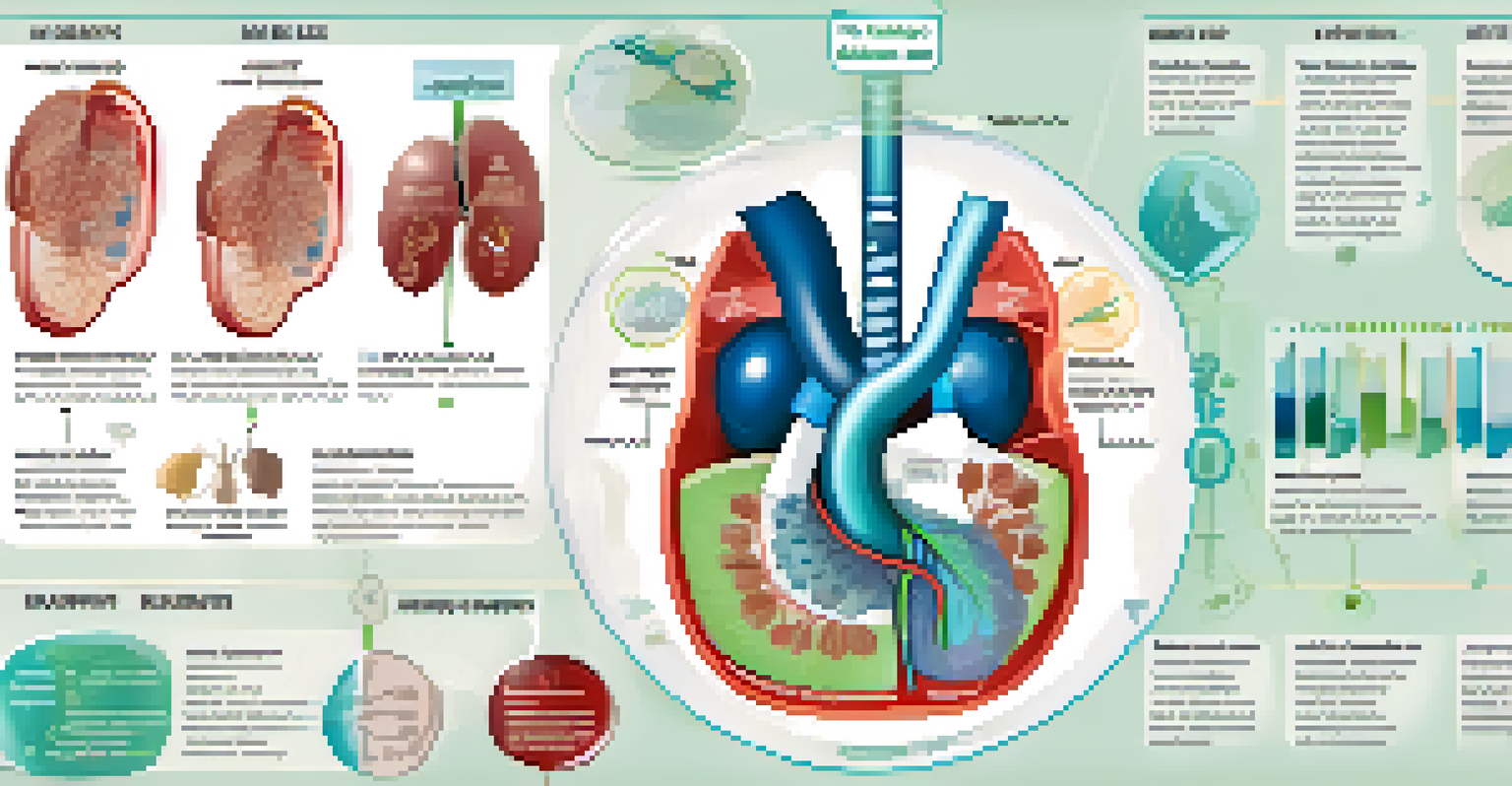High-Protein Diets: Are They Really Harmful to Your Kidneys?

Understanding High-Protein Diets and Their Popularity
High-protein diets have gained significant popularity, often touted for their weight loss benefits and muscle-building capabilities. Many people turn to these diets, hoping to achieve a leaner physique or enhance their athletic performance. However, with increased protein intake, concerns about potential kidney issues have surfaced, leading to a mixed bag of opinions among health professionals.
Protein is an essential nutrient, and while it plays a vital role in our bodies, balance is key to maintaining good health.
Typically, a high-protein diet consists of foods like lean meats, fish, eggs, dairy, legumes, and nuts, which help individuals meet their protein goals. This focus on protein can sometimes overshadow the importance of balanced nutrition, including carbohydrates and fats. As we delve deeper into the effects of these diets, it’s essential to understand not just their benefits but also the potential risks they may pose.
With so much information swirling around, discerning fact from fiction can be challenging. Are high-protein diets safe, especially for those with pre-existing kidney conditions? In the following sections, we will explore how these diets may affect kidney health and what the research says.
How the Kidneys Function and Their Role in Metabolism
To evaluate the impact of high-protein diets on kidney health, it's crucial to understand how our kidneys function. The kidneys are responsible for filtering waste products from the blood, regulating blood pressure, and balancing electrolytes. They play a vital role in processing the byproducts of protein metabolism, breaking down proteins into amino acids and removing excess nitrogen through urine.

When you consume more protein, your kidneys work harder to eliminate the additional waste generated. This can raise questions about the long-term effects of sustained high protein intake, particularly in individuals with compromised kidney function. The kidneys are resilient organs, but understanding their limits can help in making informed dietary choices.
High-Protein Diets and Kidney Risks
Increased protein intake can strain kidneys, especially in individuals with pre-existing conditions.
In essence, while healthy kidneys can typically handle increased protein levels, the body's response may vary based on individual health conditions. This brings us to a critical point: for those with existing kidney issues, a high-protein diet could pose risks that warrant further examination.
Research Insights: High Protein Intake and Kidney Health
A wealth of research has explored the relationship between high-protein diets and kidney function. Some studies suggest that a high protein intake may accelerate kidney damage in individuals with pre-existing kidney disease. However, in healthy individuals, the evidence remains less clear, with many studies indicating that high protein consumption does not adversely affect kidney function.
Hydration is crucial, especially when you're increasing protein intake; your kidneys will thank you for it.
For instance, a study published in the American Journal of Kidney Diseases found no significant impact on kidney function in healthy adults consuming high-protein diets. The key takeaway is that while healthy individuals might not need to worry, those at risk for kidney disease should approach high-protein diets with caution and consult healthcare professionals.
Ultimately, the research indicates that context matters. Understanding your personal health status and any underlying conditions is critical when considering a high-protein diet.
Signs of Kidney Stress: What to Look For
Recognizing the signs of kidney stress is essential, especially for those on high-protein diets. Symptoms may include fatigue, swelling in the legs or feet, changes in urination patterns, or persistent nausea. If you start noticing these signs, it could be an indication that your kidneys are struggling to keep up with the increased protein load.
It's important to note that these symptoms can also be linked to various other health issues. Thus, monitoring your overall health and being proactive about regular check-ups can help catch any potential problems early. If you suspect that your diet may be causing issues, consulting a healthcare provider is the best course of action.
Signs of Kidney Stress to Monitor
Recognizing symptoms like fatigue and changes in urination can help catch kidney issues early.
Awareness is key. The sooner you recognize potential issues, the better equipped you'll be to make necessary dietary adjustments and preserve your kidney health.
Balancing Protein Intake for Optimal Health
Finding the right balance of protein intake is crucial for maintaining overall health while minimizing potential risks. Instead of dramatically increasing protein consumption, consider gradually incorporating it into a balanced diet that includes a variety of nutrients. This approach ensures you're not overwhelming your kidneys while still enjoying the benefits of protein-rich foods.
For most people, aiming for a moderate protein intake is ideal. This means including sources like lean meats, fish, eggs, beans, and dairy in your meals without going overboard. The key is to listen to your body and adjust your diet based on how you feel and any feedback from health professionals.
In short, moderation is the name of the game. A well-rounded diet that respects your body's needs will support both your fitness goals and kidney health.
The Role of Hydration in Kidney Health
Hydration plays a vital role in kidney health, especially for those consuming high-protein diets. Adequate fluid intake helps the kidneys effectively filter waste and manage the increased nitrogen load resulting from protein metabolism. When you're well-hydrated, your kidneys can perform their functions more efficiently, reducing the risk of stress.
Conversely, dehydration can exacerbate kidney strain, leading to potential complications. It's essential to drink enough water throughout the day, especially if you're increasing your protein intake or engaging in strenuous exercise. Keeping your body hydrated also supports overall health, making it a simple yet powerful tool.
Consult Professionals for Guidance
Working with healthcare providers is essential for tailoring a high-protein diet to individual health needs.
So, whether you're aiming for muscle gain or weight loss, remember that hydration should be a top priority. By maintaining proper fluid levels, you're not only supporting your kidneys but also enhancing your overall wellness.
Consulting Healthcare Professionals: A Smart Move
Before embarking on a high-protein diet, consulting healthcare professionals can provide valuable insights tailored to your specific health needs. Nutritionists, dietitians, and doctors can help assess your individual risk factors and determine the most suitable dietary approach. This personalized guidance is crucial, especially if you have any pre-existing health conditions.
A healthcare provider can also help you set realistic protein goals based on your lifestyle and health status. They can assist in designing a diet plan that meets your nutritional needs while minimizing any potential risks to your kidneys. Being proactive about your health empowers you to make informed choices.

In conclusion, seeking professional advice is a smart move when considering significant dietary changes. By working with experts, you can navigate the complexities of protein intake and safeguard your kidney health.